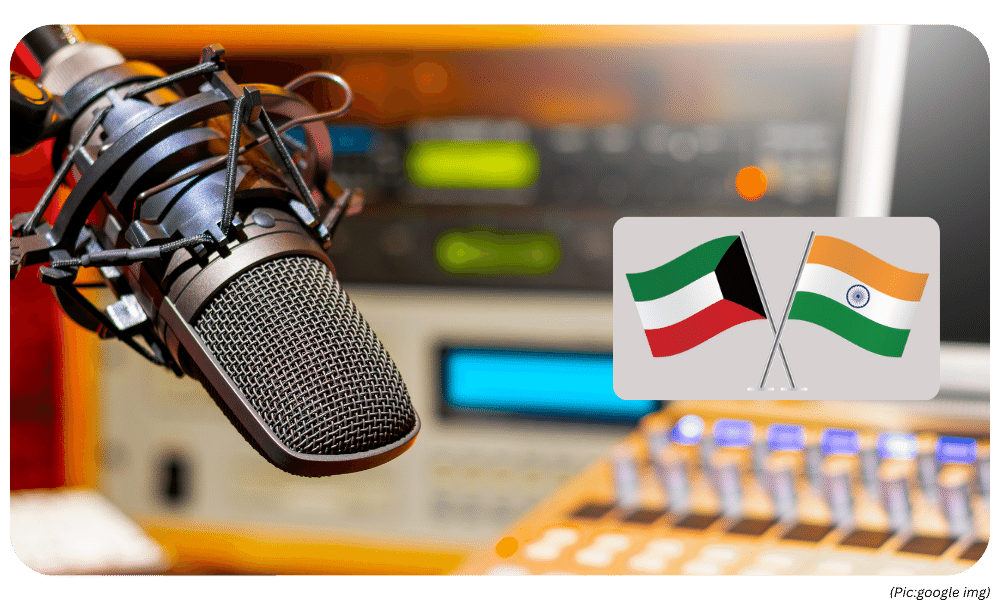Summary:
-
- Hindi Radio in Kuwait: Kuwait has launched its first-ever Hindi radio program, fostering cultural exchange between India and Kuwait.
-
- Historical Ties: The nations share a rich history of trade and cultural connections dating back to ancient times.
-
- Indian Diaspora: Indians constitute the largest expatriate community in Kuwait, contributing to its economy and cultural diversity.
-
- Cultural Significance: The Hindi radio broadcasts aim to strengthen ties by offering Indian content to Kuwaiti audiences and connecting the Indian community to their roots.
What is the news?
-
- The recent launch of the first-ever Hindi radio program in Kuwait marks a significant milestone in strengthening cultural ties between India and Kuwait. This initiative, spearheaded by the Indian Embassy in Kuwait and supported by Kuwait’s Ministry of Information, opens new avenues for cultural exchange and deeper understanding between the two nations.
Historical Ties: A Shared Past, A Flourishing Present
India and Kuwait boast a rich history of cultural and economic exchange dating back centuries. Trade routes connected the two regions, facilitating the flow of goods, ideas, and cultural influences. Here’s a glimpse into their historical ties:
-
- Ancient Trade Links: As early as the 3rd millennium BCE, there is evidence of maritime trade between the Indus Valley Civilization (present-day India and Pakistan) and Mesopotamia (present-day Iraq and Kuwait).
-
- Mughal Era Connections: The Mughal Empire (1526-1857) in India maintained strong trade relations with the Arabian Peninsula, including Kuwait. Indian merchants played a crucial role in the region’s economic activities.
-
- 20th Century Developments: Following Kuwaiti independence in 1961, diplomatic relations between India and Kuwait were formally established in 1962. Since then, the bilateral relationship has grown steadily, encompassing economic cooperation, cultural exchange, and energy security.
-
- Indian Community in Kuwait: Indians constitute the largest expatriate community in Kuwait, estimated at around one million. They play a vital role in various sectors of the Kuwaiti economy, contributing to its growth and development.
Continuation of Existing Initiatives: India and Kuwait have ongoing collaborations in various sectors like trade, energy, and security. These collaborations might have seen new developments or milestones achieved in 2024. You can search for news articles mentioning “India-Kuwait cooperation” or “India-Kuwait joint initiatives” in 2024 to find specific details.
The Significance of Hindi Radio Broadcasts
The launch of Hindi radio broadcasts in Kuwait holds immense significance for several reasons:
-
- Cultural Exchange: The program will introduce Kuwaiti audiences to Indian music, literature, and current affairs, fostering a better understanding of Indian culture.
-
- Community Connection: The large Indian diaspora in Kuwait can stay connected to their roots through familiar language programming. News, entertainment, and cultural content in Hindi can bridge the gap between their home culture and their adopted country.
-
- Strengthening Ties: This initiative strengthens the already strong cultural bond between India and Kuwait. It reflects the commitment of both nations to fostering closer people-to-people ties.
Looking Ahead: A Promising Future
-
- The launch of Hindi radio broadcasts is a testament to the evolving relationship between India and Kuwait. By promoting cultural exchange and understanding, this initiative can pave the way for even stronger ties in the years to come. This cultural bridge can further enhance cooperation in other areas like trade, investment, and education, leading to a mutually beneficial partnership.
-
- In conclusion, the introduction of Hindi radio broadcasts in Kuwait signifies a new chapter in the long-standing relationship between the two nations. It serves as a powerful symbol of cultural exchange and holds the potential to further solidify the bonds of friendship and cooperation between India and Kuwait.
QuizTime:
Mains Questions:

Question 1:
The launch of the first-ever Hindi radio program in Kuwait signifies a new chapter in the long-standing relationship between India and Kuwait. Discuss the historical ties between these two nations and analyze how the Hindi radio program can further strengthen these ties. (250 words)
Model Answer:
Historical Ties:
-
- Ancient Trade Links: Evidence suggests maritime trade existed between the Indus Valley Civilization (present-day India and Pakistan) and Mesopotamia (present-day Iraq and Kuwait) as early as the 3rd millennium BCE.
- Mughal Era Connections: The Mughal Empire in India maintained strong trade relations with the Arabian Peninsula, including Kuwait. Indian merchants played a crucial role in the region’s economic activities.
- 20th Century Developments: Following Kuwaiti independence in 1961, diplomatic relations between India and Kuwait were established. Since then, the relationship has grown, encompassing economic cooperation, cultural exchange, and energy security.
Indian Diaspora in Kuwait: Indians constitute the largest expatriate community in Kuwait, contributing significantly to its economy.
Strengthening Ties through Radio:
-
- Cultural Exchange: The program will introduce Kuwaiti audiences to Indian music, literature, and current affairs, fostering a better understanding of Indian culture.
- Community Connection: The large Indian diaspora can stay connected to their roots through familiar language programming. News, entertainment, and cultural content in Hindi can bridge the gap between their home culture and their adopted country.
- People-to-People Ties: This initiative strengthens the already strong cultural bond between India and Kuwait, reflecting a commitment to fostering closer interpersonal connections.
In conclusion, the Hindi radio program builds upon the historical foundation of India-Kuwait relations. By promoting cultural understanding and fostering connections between people, it has the potential to further strengthen these ties in the years to come.
Question 2:
The Indian diaspora plays a significant role in the economies of many Gulf countries. Discuss the challenges faced by the Indian diaspora in Kuwait and how initiatives like the Hindi radio program can address some of these concerns. (250 words)
Model Answer:
Challenges Faced by Indian Diaspora:
-
- Social Integration: Cultural differences and language barriers can create challenges for integration into Kuwaiti society.
- Limited Political Participation: As expatriates, Indians generally have limited political rights and may feel a disconnect from the decision-making process.
- Nostalgia and Maintaining Cultural Identity: Being away from their homeland, Indians may experience feelings of nostalgia and face challenges in preserving their cultural identity.
Addressing Concerns with Hindi Radio:
-
- Sense of Belonging: The Hindi program can provide a sense of belonging and connection to the Indian community in Kuwait.
- Cultural Preservation: Hindi programming can help the diaspora maintain their cultural identity by offering familiar language content.
- Bridging the Gap: The program can act as a bridge between the Indian diaspora and Kuwaiti society, fostering understanding and promoting cultural exchange.
Overall Impact:
-
- While the Hindi radio program cannot address all the challenges faced by the Indian diaspora, it serves as a positive step towards fostering a sense of community, cultural preservation, and integration. It highlights the importance of initiatives that cater to the specific needs and aspirations of the Indian diaspora in Kuwait.
Remember: These are just sample answers. It’s important to further research and refine your responses based on your own understanding and perspective. Read entire UPSC Current Affairs.
Relevance to the UPSC Prelims and Mains syllabus under the following topics:

Prelims:
-
- GS Paper I: Economics: There’s no direct mention of the Marrakesh Agreement in the UPSC Prelims syllabus. However, understanding its historical context can be relevant for Economics(WTO).
Mains:
-
- GS Paper II – International Relations (Optional):
A question on India’s cultural diplomacy efforts (indirectly connects to promoting cultural exchange and ties with other countries)
The UPSC Mains syllabus offers more opportunities to connect with this topic: - GS Paper III – Indian Economy:Evolution of International Economic Order: Briefly mentioning the historical trade links between India and the Arabian Peninsula (including Kuwait) can showcase your knowledge of historical economic connections.
- GS Paper III – General Studies II:Issues related to globalization: You can discuss the Indian diaspora as a product of globalization and how initiatives like the Hindi radio program can help them integrate while maintaining their cultural identity.
India and the World: Briefly mentioning the launch of the Hindi program and its significance in cultural exchange can showcase your awareness of current developments in India’s foreign relations.
- GS Paper II – International Relations (Optional):











0 Comments